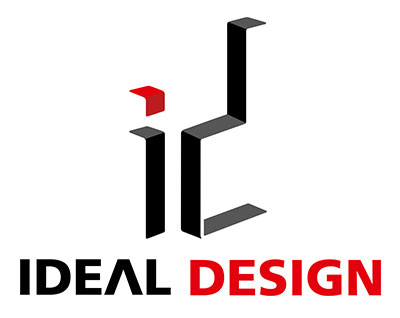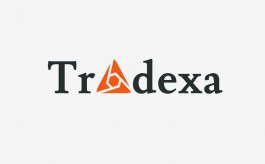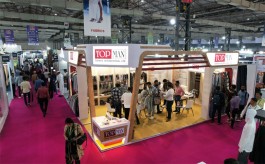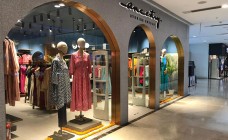Ideal Design & Display – “Is organised POP producer getting its due?”
By Smita Sinha |
October 22, 2018
Dubai-based POP and signage company Ideal Design & Display is a one-stop-shop for design, engineering & manufacturing POS and retail displays. It set up shop in India in 2012 and has some big brands in its kitty. However, the company has been dealing with some odds in the industry in the recent past. Retail4Growth finds out more about the company and the challenges it is confronting in India.
Dubai-based POS display and retail display company, Ideal Design & Display, had set up its shop in Bengaluru in 2012. The company provides concept-to-manufacturing turn-key retail solutions under one roof. It is equipped with latest equipment and high-end CAD/CAM software that turn ideas into tangible retail solutions.
 Ideal Design develops and produces POS displays, retail store fixtures, ATM enclosures and interactive kiosks only in sheet metal that is accented with acrylic, thermo-formed plastics and glass, using state-of-the-art CNC machinery. They have in-house power coating unit for surface finishes, and print department that comprises the latest flatbed UV and wide format digital printers. The company is equipped with modern manufacturing facilities in the UAE and Bangalore (India) with the capacity to handle both large and small scale projects.
Ideal Design develops and produces POS displays, retail store fixtures, ATM enclosures and interactive kiosks only in sheet metal that is accented with acrylic, thermo-formed plastics and glass, using state-of-the-art CNC machinery. They have in-house power coating unit for surface finishes, and print department that comprises the latest flatbed UV and wide format digital printers. The company is equipped with modern manufacturing facilities in the UAE and Bangalore (India) with the capacity to handle both large and small scale projects.
An ISO-14001 environment certified company, Ideal Design & Display is associated with big FMCG brands like Unilever, Himalaya, P&G and more. The company has seen 30-40% overall growth in the last four years in India.
Dealing With Odds
Despite a decent growth, the company is facing challenges in India. Firstly, the market is price driven and not quality. Brands are looking for POP displays that are easy on their pockets, which means compromising on the quality and life of the display.
Indian POP industry consists of 20% of organised players (who have INR 10 crore+ of investment) and 80% small scale fabricators. The organised POSM industry is expected to deliver quality products with consistency and ensure timely delivery of the products using high-end machinery and right process. But this comes with a price and some of the Indian brands are happy to pay that price. But majority of brands prefer to work with small-time players, who produce average quality products with delays in delivery, due to cost factor.
Some of the small fabricators deliver good quality product but the numbers is limited. “India is a very price-sensitive market, the brands are constantly pushing us for better price; the value has gone down. Neither the brands nor the procurement agencies are respecting the value of the products. They look for low-priced products,” said Jose Palathinkal, Director, Ideal Design.
Big FMCG business are driven by procurement agencies. These procurement agencies act as a third party aggregator between the industry and the POP and signage manufactures. These agencies negotiate with the manufactures, on behalf of the companies, to get the POP and signage products at the cheapest possible price.
“Earlier we worked directly with the companies. Now the companies have brought in procurement agencies for cutting the prices. These procurement agencies are squeezing us and they are not adding any value to the market,” he said.
“Procurement agencies coming into picture has also led to quality drop because they are pushing hard for cheaper prices for the POSM and signages,” Palathinkal added.
Another challenge is the L1 bidding. The procurement agencies are practising reverse bidding system in India, which is harming the business of the POP and signage manufacturers. These agencies take a prototype from various POP and signage manufactures and put it in the market for L1 bidding and then compare the product prices of all the manufacturers. They buy the products from the manufacturer who is ready to sell at a low margin.
“There should be an audit to control these procurement agencies as there is no transparency in the L1 bidding that these agencies practise. These agencies don’t share the bill on material or the cost breakdown for the design with us. We don’t even know what is being delivered to the client. Moreover, the procurement agencies charge 8-10% from POP manufacturers as agency fee,” said Palathinkal.
He further added, “L1 bidding is discouraging innovation and quality is being compromised. As the companies don’t look for innovation in design or quality products any more, they buy product which is easy on their pocketbook.”

 Ideal Design develops and produces POS displays, retail store fixtures, ATM enclosures and interactive kiosks only in sheet metal that is accented with acrylic, thermo-formed plastics and glass, using state-of-the-art CNC machinery. They have in-house power coating unit for surface finishes, and print department that comprises the latest flatbed UV and wide format digital printers. The company is equipped with modern manufacturing facilities in the UAE and Bangalore (India) with the capacity to handle both large and small scale projects.
Ideal Design develops and produces POS displays, retail store fixtures, ATM enclosures and interactive kiosks only in sheet metal that is accented with acrylic, thermo-formed plastics and glass, using state-of-the-art CNC machinery. They have in-house power coating unit for surface finishes, and print department that comprises the latest flatbed UV and wide format digital printers. The company is equipped with modern manufacturing facilities in the UAE and Bangalore (India) with the capacity to handle both large and small scale projects.






